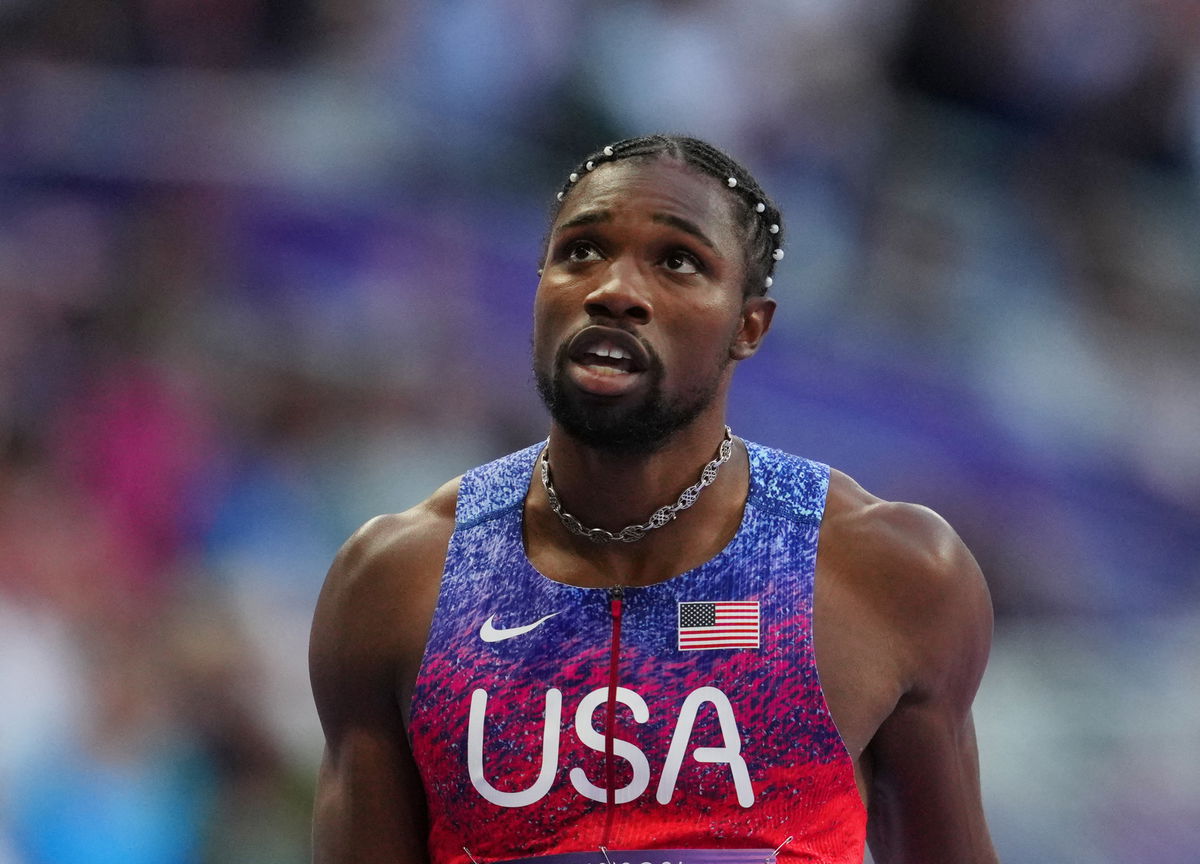
Reuters
Paris 2024 Olympics – Athletics – Men’s 200m Final – Stade de France, Saint-Denis, France – August 08, 2024. Bronze medallist Noah Lyles of United States reacts after the race. REUTERS/Aleksandra Szmigiel

Reuters
Paris 2024 Olympics – Athletics – Men’s 200m Final – Stade de France, Saint-Denis, France – August 08, 2024. Bronze medallist Noah Lyles of United States reacts after the race. REUTERS/Aleksandra Szmigiel
Noah Lyles isn’t just the fastest man in the world; he’s also one of the savviest. And when the reigning Olympic champion in the 100 meters turned down an offer to join Michael Johnson’s much-hyped Grand Slam Track league, it wasn’t just about the paycheck. It was about power, purpose, and platform. Lyles, who skyrocketed to global fame thanks to a Netflix docuseries, wasn’t convinced the league was ready for someone of his stature. In fact, he didn’t even think most people had heard of it. And that, to him, was the biggest red flag.
Watch What’s Trending Now!
Lyles admitted he had early conversations with Johnson about joining the new professional track league, which is structured to pay athletes based on performance over four meets per year. But from the start, things didn’t click. “When he came to me and asked me to be a part of it, he gave me a number,” Lyles said in an interaction with Cam Newton. “And we said that number is not a fraction of what my worth is right now,” added Lyles.
He emphasized that this happened before the Olympics. After his victories, his value only increased, but the offer didn’t grow with it. What stuck with Lyles was the league’s inability to give him what he called “market-wise value.” Even if the financial side didn’t meet his expectations, he was open to joining if there had been a strategic marketing boost attached. But there wasn’t.
“At the time, he could not give me enough reason in my head to believe that I was going to market-wise get enough value from it,” the Olympic champion said bluntly. The moment that truly sealed it for Lyles? A simple test. “Have you ever heard of Grand Slam Track?” he asked. When the host responded with a quiet “No,” Lyles grinned. “That proves my point,” said Lyles.
Noah Lyles says the number MJ offered him to join GST (pre-Olympics) was “not a fraction of what my worth is” and that he didn’t feel he would get enough marketing exposure by joining the series. But said he’s still open to joining GST in 2026.https://t.co/dqSXrfjuh1
— Jonathan Gault (@jgault13) June 2, 2025
He saw the lack of visibility as a major problem. Not just for him, but for the future of the sport. “We need to step up,” he urged, pointing out how important storytelling and marketing are in making track and field mainstream. Ironically, the very tool that boosted his fame, Netflix’s Sprint, became his standard for what effective promotion looks like. “After that came out, I was more popular than I have ever been,” Lyles said.
“I went out in London and I had high schoolers coming up to me and be like, ‘Yo, you the guy from Netflix.’” That kind of recognition was proof that when done right, track and field can compete with the biggest sports in the world. And that’s exactly what he’s waiting for. And here’s the big surprise. If Grand Slam Track levels up by 2026? Then maybe, just maybe, Lyles will lace up for it! Now, Lyles might have spilled the truth, but social media seems to be quite irritated by the same.
Fans bash Noah Lyles after GST admission
As soon as Lyles’ quotes went viral, fans flocked to the comment section to express their points of view. Lyles’ calculated refusal to join GST sparked accusations of ego, with one fan stating, “if Sha’carri signed to Grand Slam, Noah would have also… Noah thinks he’s on the same level as her, and that’s his problem… if Noah has one bad year, he will be forgotten…”
The fan believes his rejection wasn’t about marketing gaps but a personal rivalry mindset, fueled by insecurity over peer comparison. Some felt Lyles misunderstood his influence. One comment went, “The problem with Noah is he doesn’t understand that he isn’t bolt and doesn’t see the sport to anything it hasn’t been…”

This highlighted that Lyles may have overvalued his global market draw, rejecting GST despite its North American base, which could have been his most profitable stage. Not everyone bothered with diplomacy. A blunt take from another X user read, “That dude is exhausting 🙄🙄🙄,” capturing the frustration of fans weary of Lyles’ constant self-evaluation.
His focus on “market-wise value” and visibility may have come off as draining rather than inspiring, especially to those who just want to see him run. Ironically, while some criticized Lyles’ stance, others acknowledged his fame but still took issue. One track enthusiast mentioned, “You’re just hating, bro. Apart from maybe Sha’carri, there’s no track athlete worldwide known by almost most people, including non-track fans like Noah.”
The backlash got sharper when Lyles was compared to peers who embraced risk. A frustrated comment read, “Respectfully to Noah, Sydney is a bigger star than he is and she did it (plus even ran short distances too, putting her brand at risk)…” The message was clear. Being a star isn’t just about recognition but also about stepping up for the sport, something they feel Sydney did and Lyles didn’t.
Even loyal fans voiced disappointment in his approach. One wrote, “So I’ve always been a great fan of @LylesNoah. But this is so disappointing and so self-absorbed…” They argue Lyles missed a chance to uplift the sport’s ecosystem. Instead of demanding a perfect promotion, he could have helped create it from within. Thus, with things getting interesting, it remains to be seen how the situation pans out.

